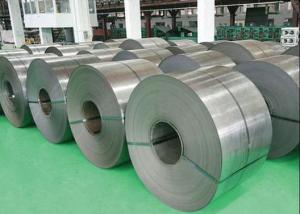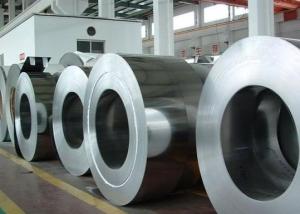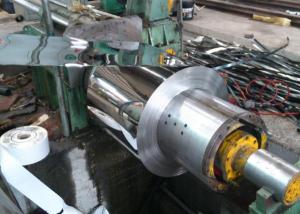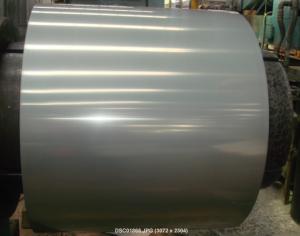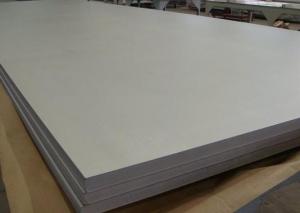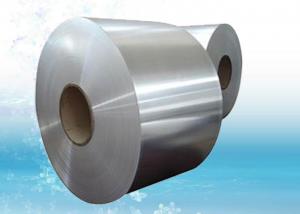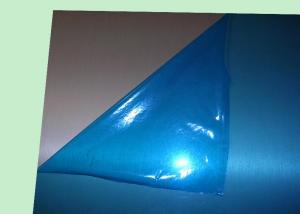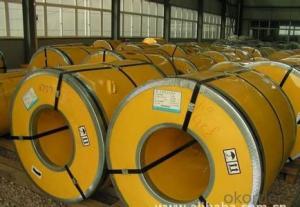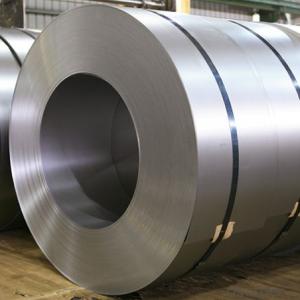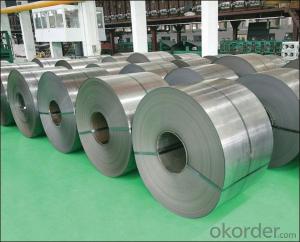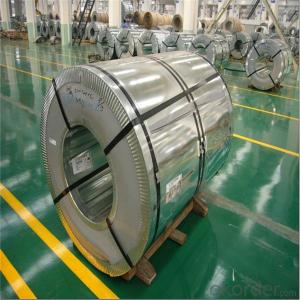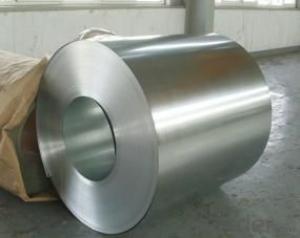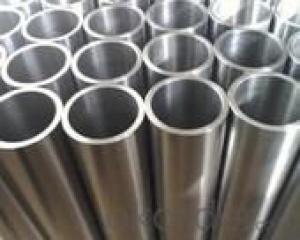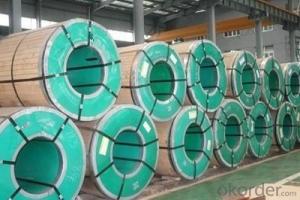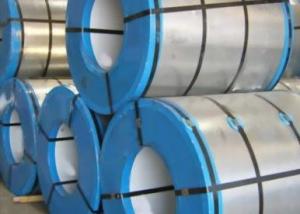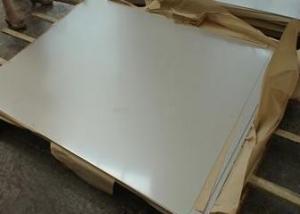316L Stainless Steel Coil
- Loading Port:
- China Main Port
- Payment Terms:
- TT or LC
- Min Order Qty:
- 1 Ton m.t.
- Supply Capability:
- 1000 Tons Per Month m.t./month
OKorder Service Pledge
OKorder Financial Service
You Might Also Like
316L Stainless Steel Coil
1. Chemical composition of 316L Stainless Steel Coil
C | Si | Mn | P | S | Ni | Cr |
Max0.03 | max1.00 | max2.00 | max0.045 | max0.03 | 10.00-14.00 | 16.00-18.00 |
2. Mechanical properties of 316L Stainless Steel Coil
Yield Strength | Tensile | Elongation | Hardness (HV) | Hardness (HRB) |
≥175 | ≥480 | ≥40 | ≤200 | ≤90 |
3. Standard of 316L Stainless Steel Coil : AISI, ASTM, GB, EN, DIN, JIS
4. Surface of 316L Stainless Steel Coil : 2B, NO.1, BA, NO.4, Hairline, SB, Mirror finish, Anti-skid, Cherkered etc.
5. Size of 316L Stainless Steel Coil :
Thickness: 0.3-3mm (cold rolled), 3-40mm (hot rolled)
Width: 1000mm or 1219mm or 1240mm for cold rolled, 1500mm for hot rolled.
Length: As customers' request.
6. MOQ of 316L Stainless Steel Coil : 1 Ton
7. Payment terms of 316L Stainless Steel Coil : T/T or L/C
8. Packing of 316L Stainless Steel Coil : Seaworthy package with wooden or Iron pallets with the paper and the steel strip,
or as customers' request.
9. Delivery time of 316L Stainless Steel Coil : Usually about 7 days after we confirming the order, or according to your quantity.
If you have any question or demand, pls feel free to contact me.
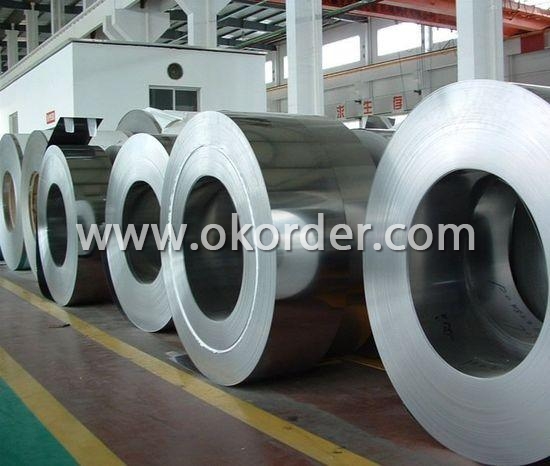
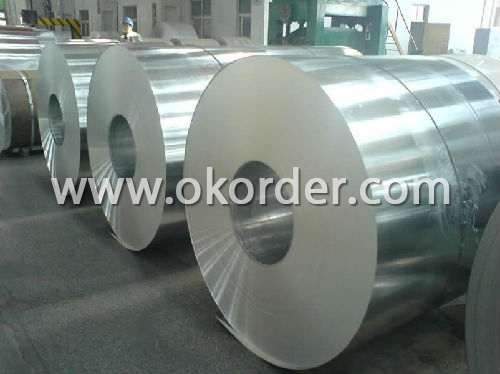
- Q: Are stainless steel strips resistant to abrasion and wear?
- Yes, stainless steel strips are highly resistant to abrasion and wear due to their excellent strength, durability, and corrosion resistance properties.
- Q: Can stainless steel strips be used in wastewater treatment plants?
- Certainly, wastewater treatment plants can employ stainless steel strips. Due to its exceptional durability and resistance to corrosion, stainless steel proves to be a fitting material for environments with significant moisture and chemical contact, like wastewater treatment plants. The utilization of stainless steel strips covers a wide range of applications in these facilities, encompassing piping, tanks, screens, and other equipment. Furthermore, stainless steel's ability to inhibit bacterial growth and its ease of cleaning contribute to its hygienic suitability for wastewater treatment purposes.
- Q: How do you prevent rust on stainless steel strips?
- To prevent rust on stainless steel strips, there are several measures you can take: 1. Regular cleaning and maintenance: It is important to clean stainless steel strips regularly to remove any dirt, debris, or contaminants that could lead to rust formation. Use a mild detergent or stainless steel cleaner and a soft cloth or sponge to clean the surface thoroughly. Avoid using abrasive cleaners or scrub brushes, as they can scratch the stainless steel and make it more prone to rusting. 2. Dry thoroughly: After cleaning, make sure to dry the stainless steel strips completely. Moisture can contribute to rust formation, so using a clean, dry cloth to wipe away any residual moisture is crucial. Pay special attention to areas where water can accumulate, such as crevices or corners. 3. Protect from chemicals and corrosive substances: Stainless steel is known for its resistance to corrosion, but certain chemicals or substances can still cause damage or rusting. Avoid exposing stainless steel strips to harsh chemicals, such as bleach or ammonia-based cleaners, as they can corrode the surface. If stainless steel comes into contact with corrosive substances, rinse it immediately with water and dry thoroughly. 4. Use protective coatings: Applying a protective coating, such as a clear lacquer or special stainless steel protective spray, can create a barrier between the stainless steel and external factors that could cause rust. These coatings provide an extra layer of protection and help maintain the appearance and durability of stainless steel strips. 5. Avoid exposure to saltwater or high humidity: Stainless steel can be more susceptible to rusting in environments with high humidity or exposure to saltwater. If possible, limit the exposure of stainless steel strips to these conditions. If it is not possible to avoid such environments, taking extra precautions, such as more frequent cleaning and using appropriate protective coatings, becomes even more important. By following these preventive measures, you can significantly reduce the risk of rust formation on stainless steel strips and ensure their longevity and aesthetic appeal.
- Q: Can stainless steel strips be used in the production of oil and gas storage tanks?
- Yes, stainless steel strips can be used in the production of oil and gas storage tanks. Stainless steel is highly resistant to corrosion, making it an ideal material for storing oil and gas, which can be corrosive substances. Additionally, stainless steel offers high strength, durability, and temperature resistance, making it suitable for the demanding conditions of oil and gas storage.
- Q: What is the impact resistance of stainless steel strips?
- Stainless steel strips have excellent impact resistance due to their inherent properties and unique manufacturing process. The impact resistance of stainless steel strips is primarily attributed to their high tensile strength and toughness. Stainless steel is an alloy composed of iron, chromium, and other elements such as nickel, molybdenum, and manganese. These elements provide stainless steel with enhanced mechanical properties, including high strength and ductility. These properties allow stainless steel strips to withstand external forces and impacts without deforming or breaking easily. Moreover, stainless steel strips undergo a process called cold rolling during their manufacturing. Cold rolling involves passing the stainless steel through a series of rollers at a low temperature, which increases its strength and hardness. This process further enhances the impact resistance of stainless steel strips. The impact resistance of stainless steel strips makes them suitable for various applications that require durability and resistance to external forces. They are commonly used in industries such as automotive, construction, aerospace, and marine, where they are exposed to harsh conditions and potential impacts. In conclusion, stainless steel strips exhibit excellent impact resistance due to their high tensile strength, toughness, and the cold rolling process they undergo during manufacture. These properties make stainless steel strips a reliable choice for applications that require resistance to external forces and impacts.
- Q: Are stainless steel strips suitable for jewelry making?
- Indeed, stainless steel strips prove to be an ideal option for crafting jewelry. This material, known for its durability and versatility, exhibits remarkable resistance against tarnishing, rust, and corrosion, thus ensuring the longevity of the jewelry. Moreover, stainless steel possesses hypoallergenic properties, rendering it suitable for individuals with sensitive skin or allergies to metals. The flexibility of stainless steel strips facilitates their manipulation into diverse jewelry designs, encompassing rings, bracelets, necklaces, and earrings. Furthermore, stainless steel frequently serves as a cost-effective substitute for pricier metals such as silver or gold, enabling those with a desire for high-quality jewelry to acquire it at a more affordable price.
- Q: Can stainless steel strips be used in aerospace manufacturing?
- Indeed, aerospace manufacturing can make use of stainless steel strips. Renowned for its robustness and resistance to corrosion, stainless steel emerges as a prime option for diverse aerospace applications. It finds frequent utilization in the assembly of aircraft structures, including fuselage frames, wing components, engine mounts, and landing gear. Moreover, stainless steel strips boast an impressive strength-to-weight ratio, rendering them fitting for endeavors that demand substantial strength and rigidity while minimizing mass. Furthermore, stainless steel demonstrates exceptional endurance in the face of extreme temperatures, all the while exhibiting remarkable resistance to fatigue. These qualities combine to establish stainless steel as a dependable material for aerospace manufacturing.
- Q: Can 111 stainless steel strips be coated with anti-corrosion coatings?
- Yes, 111 stainless steel strips can be coated with anti-corrosion coatings.
- Q: Can stainless steel strips be used in architectural roofing systems?
- Yes, stainless steel strips can be used in architectural roofing systems. Stainless steel is a durable and corrosion-resistant material, making it suitable for use in exterior applications such as roofing. It offers strength, longevity, and a modern aesthetic, making it a popular choice in architectural designs.
- Q: Can stainless steel strips be used in the chemical industry?
- Stainless steel strips are indeed applicable in the chemical industry. Renowned for its exceptional resistance to corrosion, stainless steel emerges as the perfect selection for environments containing chemical substances. It can endure contact with different chemicals, acids, and alkalis, enabling its utilization in chemical storage tanks, pipes, valves, and fittings. Moreover, stainless steel strips exhibit durability, ease of cleaning, and the ability to retain their strength and integrity under severe chemical conditions. Consequently, they enjoy extensive employment in the chemical industry due to their dependability and long-lasting nature.
1. Manufacturer Overview
| Location | Zhejiang,China |
| Year Established | 2010 |
| Annual Output Value | Above US$16Million |
| Main Markets | Japan, South America |
| Company Certifications | ISO9001:2000; |
2. Manufacturer Certificates
| a) Certification Name | |
| Range | |
| Reference | |
| Validity Period |
3. Manufacturer Capability
| a) Trade Capacity | |
| Nearest Port | Shanghai |
| Export Percentage | 60% |
| No.of Employees in Trade Department | 50 People |
| Language Spoken: | English;Chinese; Japanese |
| b) Factory Information | |
| Factory Size: | Above 80,000 square meters |
| No. of Production Lines | Above 8 |
| Contract Manufacturing | OEM Service Offered;Design Service Offered |
| Product Price Range | Average |
Send your message to us
316L Stainless Steel Coil
- Loading Port:
- China Main Port
- Payment Terms:
- TT or LC
- Min Order Qty:
- 1 Ton m.t.
- Supply Capability:
- 1000 Tons Per Month m.t./month
OKorder Service Pledge
OKorder Financial Service
Similar products
Hot products
Hot Searches
Related keywords
